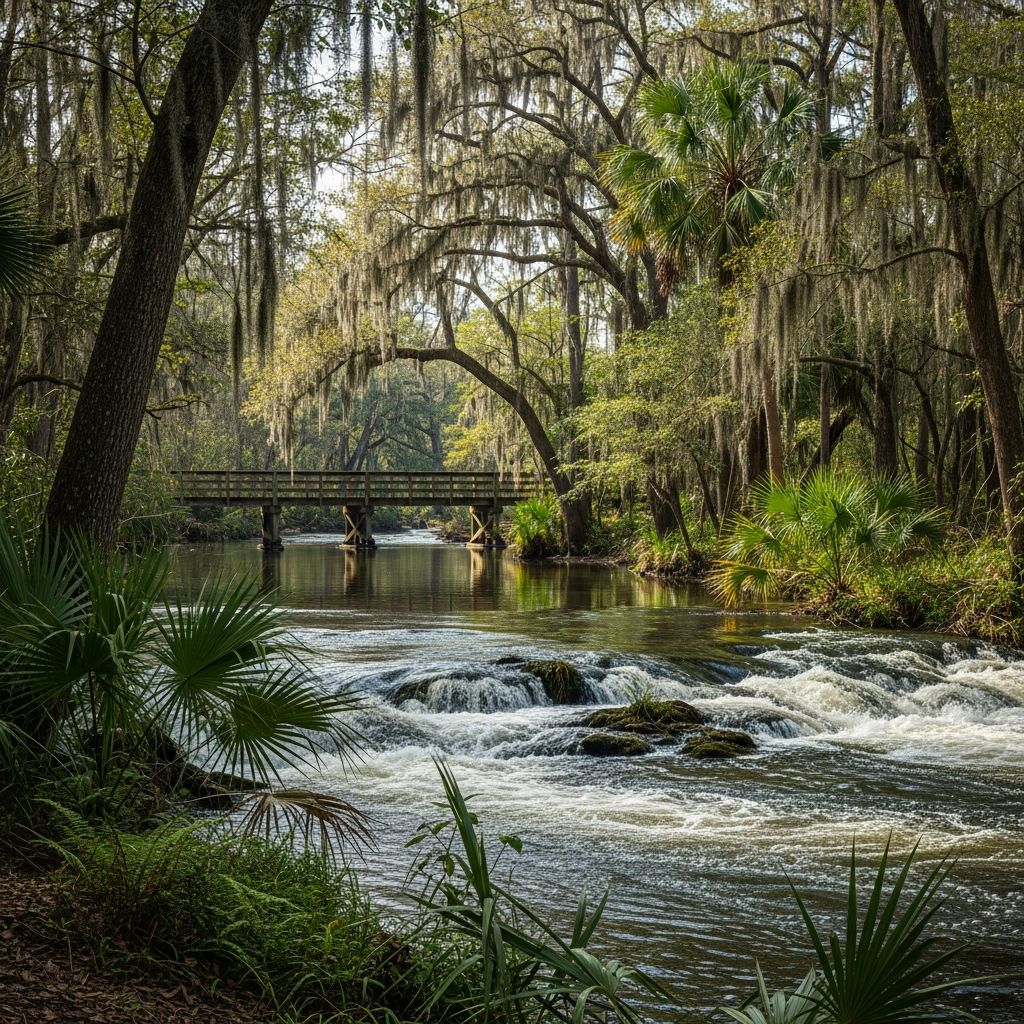Hillsborough River State Park: Nature, Adventure, and Florida’s Hidden Rapids
Discover Tampa Bay’s wild oasis—hiking trails, historic sites, rare Class II river rapids, and endless outdoor adventures await.

Hillsborough River State Park: A Tampa Bay Adventure Awaits
Nestled just a short drive northeast of downtown Tampa, Hillsborough River State Park offers a rare slice of wild Florida. Known for its lush forests, superb nature trails, native wildlife, and one of Florida’s few naturally occurring Class II river rapids, this park is a sanctuary for outdoor enthusiasts, history lovers, and families alike. The park’s mix of recreational activities, tranquil scenery, and historical significance make it a must-visit spot for anyone seeking to explore Tampa Bay’s natural side.
Getting Oriented: Park Overview
Encompassing over 2,900 acres, Hillsborough River State Park is renowned for its seven miles of nature trails, boardwalks hugging the winding river, restored historic sites, and riverside campgrounds. Ancient cypress trees, oaks draped in Spanish moss, and diverse Floridian habitats line the landscape, providing a vibrant backdrop for hiking, biking, paddling, and wildlife spotting. This impressive range of activities makes the park one of the top recreational destinations in the Tampa Bay region.
Highlights and Main Attractions
- Class II Rapids: A rare sight for Florida, these natural rapids attract kayakers and photographers.
- Nature Trails: Well-maintained trails offer scenic woodland hikes suitable for all ages and abilities.
- Historic Fort Foster Site: A re-created military fort from the Second Seminole War era, bringing history to life.
- Camping Facilities: Choose from modern campsites or primitive group sites.
- Paddling: Canoeing and kayaking on the scenic river, with abundant opportunities to observe wildlife.
- Interpretive Center: Learn about the region’s rich natural and cultural history.
A Walk Through History: Native Lands & Fort Foster
The area around the Hillsborough River has been inhabited for thousands of years, shaped by the lives of Native American tribes and later, European explorers. The park’s history is intertwined with the turbulent era of the Second Seminole War during the 1830s. Fort Foster, now reconstructed and occasionally open for living history events, was a strategic military outpost used to protect a vital river crossing and supply route.
The park’s Interpretive Center—originally the ranger station—houses artifacts, exhibits, and educational materials that highlight the indigenous cultures, the military campaigns, and the ecological transformations of the region. Through hands-on displays and period reenactments, visitors gain an understanding of the dramatic encounters between U.S. soldiers and indigenous Seminole clans that shaped Florida’s frontier.
Fort Foster Interpretive Center
- Location: Parking Lot #1 near the park entrance
- Exhibits: Artifacts, dioramas, and exhibits on the Second Seminole War
- Hours: Typically open daily, 9 AM to 4 PM (check for seasonal adjustments)
- Highlights: Model fort, uniform and weapon replicas, and guided tours during special events
Outdoor Activities: Explore, Paddle, Camp, and Ride
Hillsborough River State Park is a playground for hikers, nature lovers, paddlers, cyclists, and campers. Whether you prefer adrenaline-filled water sports or a peaceful walk under towering pines, there’s something for everyone.
Hiking and Nature Trails
| Trail Name | Distance | Features |
|---|---|---|
| Rapids Nature Trail | 0.5 miles | Leads to scenic Class II rapids; photography & wildlife viewing |
| Baynard Trail | 1.1 miles | Palm hammocks, wooden boardwalks, riverside vistas |
| Wetlands Restoration Trail | 6 miles (paved) | Ideal for cycling, birding, butterflies, and wildflowers |
| Hickory Trail | 1.6 miles | Mixed pine flatwoods and hydric hammock ecosystems |
Trail surfaces are mostly flat, with accessible boardwalks and bridges, making them suitable for visitors of all ages and mobility levels. The trails wind through cypress swamps, shady groves, and open pine flatwoods—offering frequent sightings of white-tailed deer, gopher tortoises, turtles, wading birds, and butterflies. Each trail showcases a slightly different habitat, providing a comprehensive look at Florida’s distinct natural environments.
Paddling & Fishing on the Hillsborough River
The river is the park’s centerpiece, slicing through its heart with clear, slow-moving water that transforms into swirling rapids along rocky outcrops—a rarity in this otherwise flat state. Canoeing and kayaking are major draws, with three official launch sites. Motorized boats are prohibited, preserving a tranquil experience for paddlers who often share the waterway with herons, turtles, and the occasional alligator basking in the sun.
- Paddling routes: Navigate upstream to the rapids or drift quietly beneath ancient cypress trees. Shaded tunnels, abundant wildlife, and secluded bends make every trip unique.
- Fishing: Anglers find success with largemouth bass, bream, and catfish, especially in calm river nooks and tannin-rich waters. Catch-and-release is encouraged to preserve fish populations.
- Kayak and canoe rentals: Rentals are available at the concession stand (check for seasonality or closures). Bring your own vessel for more flexibility.
- Wildlife encounters: Watch for blue herons, turtles, otters, and sunning alligators throughout the year.
Camping Choices: Riverside to Primitive
Whether you prefer modern comfort or backcountry solitude, you’ll find a site that suits your needs.
- Main Campground: 114 sites with electric and water hookups; divided into three loops with accessible restrooms/showers. Large, shaded sites suit tents or RVs; some are ADA-compliant and pet-friendly.
- Camp amenities: Dump station, picnic tables, grills, fire rings, and a campfire circle are provided. Dogs are allowed in the campground (leash required), making it a great spot for families with pets.
- Primitive Group Camping: Designed for Scouts, church groups, and organized nonprofits. Four separate, wooded areas include picnic tables, water, grills, fire rings, and basic restrooms (cold showers, no electricity). No pets or vehicle access; gear must be carried in.
Cycling in the Park
- Wetlands Restoration Nature Trail offers a six-mile paved route, ideal for recreational bikers or families.
- Scenic views of pinelands, wildflowers, and occasional deer or wild turkeys add to the cycling experience.
- Bikes are available for rent at the park concession (when open).
Picnicking, Geocaching, and Family Activities
- Picnic areas: Multiple pavilions equipped with tables and grills are available throughout the park—perfect for gatherings, reunions, and post-trail snack breaks.
- Playgrounds: Shaded play spaces for children near picnic areas create opportunities for families to relax and enjoy the outdoors together.
- Geocaching: Join Operation Recreation Geotour, hunt for geocaches hidden in the park, and participate in special kids’ nature card activities. GPS devices and smartphone apps make it easy for all ages.
Flora, Fauna, and Unique Ecosystems
The park’s location at the intersection of several ecosystems means that hikers may encounter:
- Cypress Swamps: Towering cypress knees, woodpeckers, and tree frogs thrive here.
- Pine Flatwoods: Sun-drenched meadows with wildflowers, tufts of saw palmetto, and deer trails.
- Hydric Hammocks: Shade-loving ferns, towering oaks, and a cool canopy for respite from Florida’s sun.
- Riverbanks: Watch for turtles, alligators, herons, limpkins, and the occasional otter along the shorelines.
The park is a prime site for birdwatching, supporting native and migratory species at different points of the year. River otters, foxes, armadillos, and colorful butterflies are also common sightings, especially during early morning or dusk strolls.
Visitor Essentials: Planning Your Trip
- Location: 15402 US-301 North, Thonotosassa, Florida 33592
- Hours: Open 8 AM until sundown, 365 days a year
- Entrance Fee: Per vehicle fee (cash or card at the gate)/person on foot or bike
- Facilities: Restrooms, changing areas, showers, concession stand (seasonal), and gift shop
- Pets: Permitted on leash in most outdoor areas (not in primitive group camping)
- Accessibility: ADA-accessible trails, restrooms, and campsites available
- Best Time to Visit: Winter and spring offer cooler temperatures, active wildlife, and fewer mosquitos. Weekdays provide quieter trails and campsites.
Tips for Visitors:
- Apply sunscreen and bring insect repellent year-round.
- Carry plenty of water, especially if hiking or biking.
- Check river conditions and rental status in advance if planning to kayak or canoe.
- Respect wildlife—observe from a distance and never feed animals.
- Leave no trace: Pack out what you pack in to keep the park pristine.
Nearby Sights & Excursions
- Florida Aquarium: Renowned for marine exhibits, roughly 19 miles away.
- Busch Gardens Tampa Bay: Adventure park and zoo, less than 14 miles from the park.
- Manatee Viewing Center: Seasonal manatee observation, 26 miles distant.
- Henry B. Plant Museum & Tampa Riverwalk: Explore Tampa’s historic, cultural, and scenic gems within an easy drive.
- Wat Mongkolratanaram (Tampa Thai Temple): Celebrate local culture and food just 17 miles away.
Frequently Asked Questions (FAQs)
Q: Can I swim in the Hillsborough River at the park?
A: No, swimming is not permitted in the river due to strong currents, wildlife safety, and preservation of natural habitats.
Q: Are pets allowed throughout the park?
A: Pets are welcome on leashes in most areas, including the main campground and trails. They are not allowed in primitive group camping or buildings.
Q: Do I need to bring my own kayak or canoe?
A: The park typically offers kayak and canoe rentals at its concession stand, but it’s wise to check rental status beforehand as availability can change with the season or for maintenance.
Q: What wildlife am I likely to see?
A: Expect to see wading birds (herons, egrets), turtles, deer, alligators, wild turkeys, otters, and various songbirds, butterflies, and reptiles along the trails and riverbanks.
Q: What are the camping reservation policies?
A: Reservations are recommended and can be made online or by phone. Main campgrounds fill quickly during peak season and holidays, so book early for best selection.
Visitor Tips & Conservation
- Stay on marked trails to protect sensitive ecosystems and avoid damaging native plants.
- Respect all signs regarding wildlife and habitat protection, particularly around the river and wetland areas.
- Photography is encouraged, but always observe wildlife from a safe distance and refrain from disturbing animals in their natural habitats.
- Support the park: Purchase concessions, souvenirs, or educational materials to help fund maintenance and further interpretation projects.
Experience the Real Florida
Hillsborough River State Park remains a testament to the wild, unspoiled beauty of Florida. Whether you come to hike, paddle, camp, fish, or immerse yourself in local history, this park provides a restorative escape from city life and a deep connection to the region’s natural heritage. Let the river’s rhythm, ancient trees, and the whisper of wildlife remind you of the richness that lies just beyond Tampa’s urban edge.












